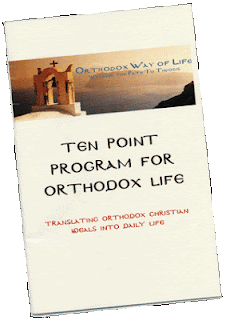When caught in this snare, a person thinks and claims he is acting according to “spiritual principles,” but in actuality he is following his own will, satisfying and preserving his own ego, and remaining hardened in his own opinions. “A web of ideas is spun,” Fr. Seraphim explained, “which has no real contact with reality…. Usually the devil uses one little idea to ‘catch’ us, knowing that it will catch us in something we may be emotional about and that ‘catch’ is sufficient to get us weave the whole spiderweb which trips us up.”
Hieromonk Damascene in Father Seraphim Rose: His Life and Works
For many years I was trapped with “spiritual” self-opinion. Not satisfied with the teachings of the Church, I set out to develop my own view––my own religion in reality. At this time, I was a top corporate executive in my early forties, on top of the world with prestige, power, a beautiful family, and a hugh ego. I had the idea that I could develop the universal principles of all religions, use this as the basis for a values based leadership program and then establish an institute to train the future leaders of the world. I would change the world nurturing spiritual growth in all(and become famous). I even had a self-induced vision of this on Mount Tabor on a quasi spiritual journey patterned after the “Hero's Journey” as conceived by Joseph Campbell in his first book “The Hero with a Thousand Faces.” I worked on this for a number of years, studying the foundational texts of various religions. I learned to meditate using a passage of my own choosing according to the principles of an eclectic Hindu tradition. This gave me a focused mind to concentrate on this Don Quixotic venture. I thought I was doing God’s will.
I then set out to establish a spiritual based community, using my own savings to fund it. This would become the base for this leadership institute, I thought. I was committed to change the world based on my self-conceived web of ideas. This lasted for another four years. Finally, it became obvious that this was financial disaster and I was about to lose my life’s savings. I felt like the world was closing in around me. I had never experienced failure before.
I was married to a Greek girl who was Orthodox and had joined the Church when we were married. I attended Church several times a year and with great apprehension and resistance participated in the customary acts of communion twice a year. Then one day walking in the woods, it came to me how folly this was and how egotistical I was being. I saw how I was tangled up in my own thinking and there was no clear way out. I was caught in my own web. My intentions seemed good but there was no result for all these good intentions other than many troubles (among which my wife had threatened to leave me) and financial ruin. I had participated in the creation of a new “church” and my soul was dead.
“By yourself you will only spend your life trying to preserve your soul, under the pretext of your understanding of Church ‘principles’ and the like; and he who would preserve his soul will lose it. Only if you try to lose your soul for Christ, by really committing yourself, will you finally gain it.”
Fr. Seraphim Rose
Fortunately, I had recently begun to recite the Jesus Prayer, and study the book by Saint Theophan the Recluse, The Path to Salvation. He became my savior. I knew I could not longer avoid Christ and my Orthodox Tradition. Out of desperation, I called a couple of monasteries for advice and began to see my local parish priest. This was a big step and was difficult at first. Within six months, I made a commitment to the Church, a clear choice to follow christ and the tradition of His Church. This led to actions to sell the property and disband the community. Miraculously, the Bishop of our diocese was looking for a retreat center site. I was able to arrange for the sale to the Church and it became a retreat center and camp for the Diocese. Five years later, I was ordained as a Deacon in the Orthodox Church. I have changed and my life has changed. I still struggle, but with God’s help it is a struggle filled with joy.
Bottom line: “Only if you try to lose your soul for Christ by really committing yourself, will you finally gain it.”
